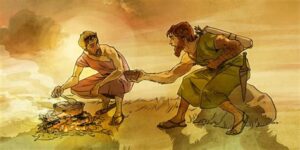The Division of the Two Brothers
36: 43b
The division of the two brothers REFLECT: At heart, are you an Esau or a Jacob? It can’t get any more basic than that. At your deepest level, do you desire the things of this world, or the things of God? Your decision has eternal consequences.

There is perhaps no greater contrast in Scripture than what is seen in the characters of Esau and Ya’akov. Esav was sensual in the sense that he lived his life for personal enjoyment. He lived for the moment and seemed perfectly willing to sacrifice everything to get whatever he wanted right then and there. He was in every sense earthy and earth bound. His life was secular. Everything in him was of the world and the flesh, and no part of his life was devoted to ADONAI. This was the root of his trouble. God was not at all in his thoughts. The purpose of Esau’s genealogy is to show that the seed of the serpent (3:15a) is alive and well on planet earth. They are multiplying and being fruitful.
The rich young ruler who came to the Lord had the splendid advantages of age, position, wealth, opportunity, earnestness and even moral integrity, and yet, when he was put to the test he revealed his deliberate unwillingness to surrender to Christ and to allow Him to be the Master of his life (see my commentary on The Life of Christ, to see link click Il – The Rich Young Ruler).549 That was the difference between Esau and Jacob. Although Ya’akov was far from perfect, he loved God, submitted to Him and allowed Him to mold and shape his life. More than that, Jacob wanted to be molded, to be conformed to the likeness of His Son (Romans 8:29a). In the final analysis, Jacob was a righteous man (see Gn – Then Jacob Gave Esau Some Lentil Stew and Esau Despised His Birthright).
This was Esav, the father of the Edomites (36:43c). Esau settled in the land of Edom, and the land of Canaan is surrendered to Jacob. With this statement, Esav disappears from the biblical record, never to be mentioned again. This is contrasted with Jacob who lived in the land where his father had stayed, the Promised Land of Canaan (37:1).
Esau had set his heart on the here and now. It seemed that God’s promises to Abraham and Isaac meant nothing to him. Here then, God has given us a picture of Esav’s family, and then He turns the page. The rest of the story lies with Jacob’s family; they would be the Seed of the woman (3:3:15a), or the line of blessing.550
Haftarah vaYishlach: Hoshea (Hosea) 11:7-12:11 (A);
Ovadyah (Obediah) 1-21 (S)
(see my commentary on Deuteronomy, to see link click Af – Parashah)
Obediah, the servant of ADONAI, was a pious Edomite governor in the palace of the wicked king Ahab. Writing on the struggle between Judah and Edom, Obediah prophesied that Edom’s envy concerning Jacob’s election (Genesis 27:41) would eventually bring about their ruin (Obediah 1:15-18). A day would come when when Edom would watch, with contempt, the destruction of Judah and Jerusalem without lifting a hand to help his hurting brother (Psalm 137:7). This contempt is a chilling reminder of Lemech’s arrogance shortly before Cain’s line was annihilated (Genesis 4:23-24). Edom’s violence against his brother (Obediah 1:10-11) is rooted in Hagar’s hatred of Sarah (Genesis 16:5). Edom will be destroyed, and his kingdom will become the LORD’s (Obediah 1:20-21).
B’rit Chadashah suggested reading for Parashah vaYishlach:
Hebrews 11:20; First Corinthians 5:1-13; Revelation 7:1-12
The author of Hebrews builds on ADONAI’s prophecy to Rebekah (Genesis 25:23) and Isaac’s blessing of Jacob (Genesis 28:3-4). Isaac, with eyes of faith, refers to an unseen future (Hebrews 11:20). Hebrews shows that the patriarchs died without experiencing the fulfillment of God’s promises – rather, they salute the promises from afar (Hebrews 11:13-16). Isra’el bowed down to Esau to keep peace, reconcile, and return the blessing (Genesis 33:1-17). But later, Edom hardened into a covetous nation gloating over Isra’el’s discipline by the LORD (Obediah 1:11-12). Remember that Lot’s wife lost her life by looking back upon Sodom’s judgment! Similarly, Edom’s gloating over the punishment of Isra’el costs this nation eternal life! For its part, Isra’el must stay holy to be fruitful, multiply, and fill the land of her inheritance. Apart from obedience, Isra’el will see the promises from afar, staying small as a people, with small need for more land (Deuteronomy 7:22).



Leave A Comment